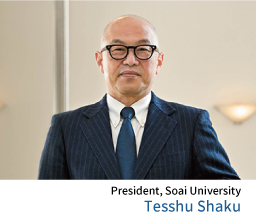Greetings from the President
 The Soai University campus is filled with lush greenery. While walking, sounds of stringed and wind instruments are carried to us from somewhere on the breeze. Students in the Faculty of Music are practicing. They demonstrate their skills, honed from profound daily practice, in various concerts. In 2010, they even held concerts in China, impressing the Chinese people.
The Soai University campus is filled with lush greenery. While walking, sounds of stringed and wind instruments are carried to us from somewhere on the breeze. Students in the Faculty of Music are practicing. They demonstrate their skills, honed from profound daily practice, in various concerts. In 2010, they even held concerts in China, impressing the Chinese people.
At a supermarket near the campus, box lunches that a student in the Faculty of Human Development designed are sold. That student won first prize in a competition which involved devising nutritionally well-balanced box lunches. Her lunch was commercialized and lined up on the shelves of many convenience stores.
The Faculty of Humanities has planned and held symposiums for the general public which involved such interesting content as “laughter and culture,” “problems about life and death,” and “the roles that the Humanities play,” each receiving good reviews. In addition to these symposiums, the faculty has held various other activities that have drawn outside interest.
Along with its goal of deepening knowledge of the arts and sciences, the Faculty of Humanities treasures the relationship with community and society and sends out what it learns to the society at large. An underlying principle upon which these activities are based is the school motto “To-So-Kyo-Ai”.
Soai University originates from Soai Women’s School, which was established in 1888. The name “Soai” comes from “To-So-Kyo-Ai”, a phrase from one of the Buddhist scriptures that Mahayana Buddhism, especially Jodo Shinshu Buddhism, is based on.
“To-So-Kyo-Ai” emphasizes the importance of people respecting and taking good care of each other. For the past 120 years, this ideal has been the cornerstone of education and research at Soai University.
As globalization continues in the world and society, values will be diversified and competition will become more cutthroat. Under these conditions, knowing the preciousness of “loving and respecting other people just as we do ourselves” and putting this ideal into practice will give us a great power to survive intact in the future society. What the students learn and experience in this university will become the basis of their lives and will surely help them become people who are useful to society.
This university has made academic agreements with many foreign universities. In recent years, above all, the opportunities for exchange with universities in China have increased, and many foreign students from China are studying Japanese culture on our campus. They exchange culture and opinions with Japanese students, which stimulates their intellects and helps broaden their perspectives and world views.
Soai University is located near Osaka Port. Since ancient times, Osaka has prospered as an important place for marine traffic. During the Qin and Tang dynasties of China, the Japanese mission set out for the Asian continent from the old Osaka port, “Naniwatsu,” which played the role of the gateway where people, things, culture, and advanced technology entered Japan from foreign countries and which was the center of international exchange. In addition, Osaka is located in the center of the Kansai region (the south-western half of Japan), so it takes only one or two hours to go to one of the former capital cities, Kyoto and Nara, or the international city, Kobe. All of these points are thought to be very attractive to those who want to learn about Japanese culture and history.
